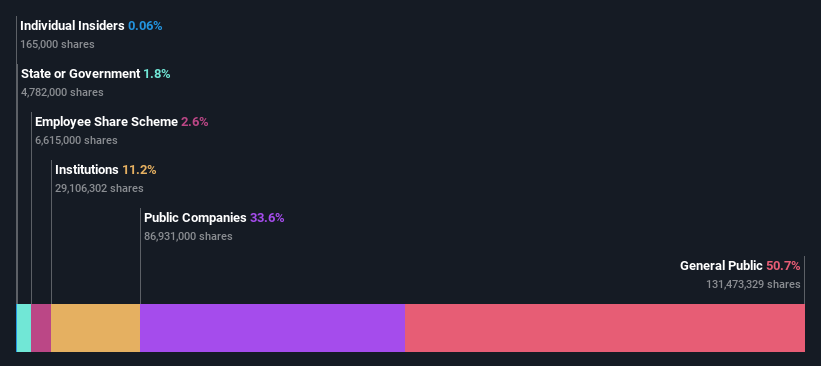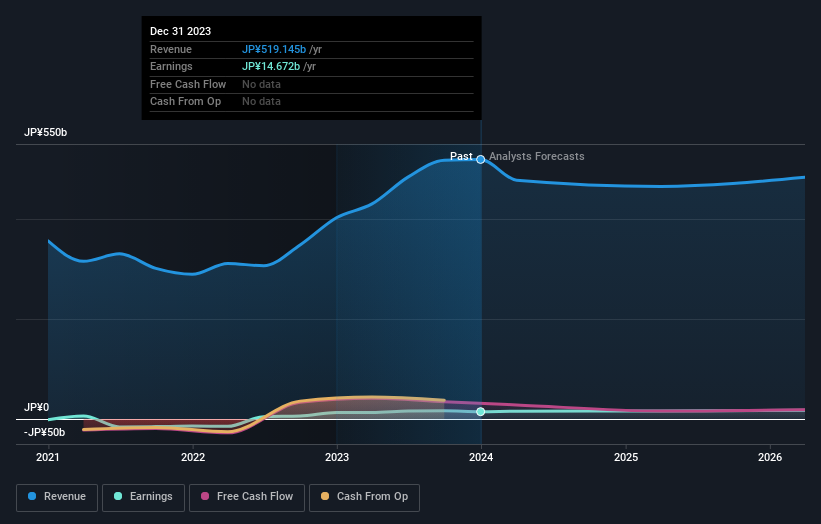- Japan
- /
- Construction
- /
- TSE:6366
Chiyoda Corporation's (TSE:6366) biggest owners are retail investors who got richer after stock soared 12% last week

Key Insights
- The considerable ownership by retail investors in Chiyoda indicates that they collectively have a greater say in management and business strategy
- 50% of the business is held by the top 13 shareholders
- Institutions own 11% of Chiyoda
Every investor in Chiyoda Corporation (TSE:6366) should be aware of the most powerful shareholder groups. With 51% stake, retail investors possess the maximum shares in the company. In other words, the group stands to gain the most (or lose the most) from their investment into the company.
As a result, retail investors collectively scored the highest last week as the company hit JP¥81b market cap following a 12% gain in the stock.
Let's take a closer look to see what the different types of shareholders can tell us about Chiyoda.
See our latest analysis for Chiyoda

What Does The Institutional Ownership Tell Us About Chiyoda?
Many institutions measure their performance against an index that approximates the local market. So they usually pay more attention to companies that are included in major indices.
We can see that Chiyoda does have institutional investors; and they hold a good portion of the company's stock. This implies the analysts working for those institutions have looked at the stock and they like it. But just like anyone else, they could be wrong. It is not uncommon to see a big share price drop if two large institutional investors try to sell out of a stock at the same time. So it is worth checking the past earnings trajectory of Chiyoda, (below). Of course, keep in mind that there are other factors to consider, too.

Hedge funds don't have many shares in Chiyoda. The company's largest shareholder is Mitsubishi Corporation, with ownership of 34%. In comparison, the second and third largest shareholders hold about 3.5% and 2.2% of the stock.
Looking at the shareholder registry, we can see that 50% of the ownership is controlled by the top 13 shareholders, meaning that no single shareholder has a majority interest in the ownership.
Researching institutional ownership is a good way to gauge and filter a stock's expected performance. The same can be achieved by studying analyst sentiments. There are plenty of analysts covering the stock, so it might be worth seeing what they are forecasting, too.
Insider Ownership Of Chiyoda
The definition of an insider can differ slightly between different countries, but members of the board of directors always count. Management ultimately answers to the board. However, it is not uncommon for managers to be executive board members, especially if they are a founder or the CEO.
Most consider insider ownership a positive because it can indicate the board is well aligned with other shareholders. However, on some occasions too much power is concentrated within this group.
Our information suggests that Chiyoda Corporation insiders own under 1% of the company. It appears that the board holds about JP¥52m worth of stock. This compares to a market capitalization of JP¥81b. We generally like to see a board more invested. However it might be worth checking if those insiders have been buying.
General Public Ownership
The general public, who are usually individual investors, hold a substantial 51% stake in Chiyoda, suggesting it is a fairly popular stock. With this amount of ownership, retail investors can collectively play a role in decisions that affect shareholder returns, such as dividend policies and the appointment of directors. They can also exercise the power to vote on acquisitions or mergers that may not improve profitability.
Public Company Ownership
It appears to us that public companies own 34% of Chiyoda. It's hard to say for sure but this suggests they have entwined business interests. This might be a strategic stake, so it's worth watching this space for changes in ownership.
Next Steps:
While it is well worth considering the different groups that own a company, there are other factors that are even more important. For instance, we've identified 1 warning sign for Chiyoda that you should be aware of.
But ultimately it is the future, not the past, that will determine how well the owners of this business will do. Therefore we think it advisable to take a look at this free report showing whether analysts are predicting a brighter future.
NB: Figures in this article are calculated using data from the last twelve months, which refer to the 12-month period ending on the last date of the month the financial statement is dated. This may not be consistent with full year annual report figures.
New: AI Stock Screener & Alerts
Our new AI Stock Screener scans the market every day to uncover opportunities.
• Dividend Powerhouses (3%+ Yield)
• Undervalued Small Caps with Insider Buying
• High growth Tech and AI Companies
Or build your own from over 50 metrics.
Have feedback on this article? Concerned about the content? Get in touch with us directly. Alternatively, email editorial-team (at) simplywallst.com.
This article by Simply Wall St is general in nature. We provide commentary based on historical data and analyst forecasts only using an unbiased methodology and our articles are not intended to be financial advice. It does not constitute a recommendation to buy or sell any stock, and does not take account of your objectives, or your financial situation. We aim to bring you long-term focused analysis driven by fundamental data. Note that our analysis may not factor in the latest price-sensitive company announcements or qualitative material. Simply Wall St has no position in any stocks mentioned.
Have feedback on this article? Concerned about the content? Get in touch with us directly. Alternatively, email editorial-team@simplywallst.com
About TSE:6366
Chiyoda
Engages in the integrated engineering business in Japan and internationally.
Excellent balance sheet with reasonable growth potential.


